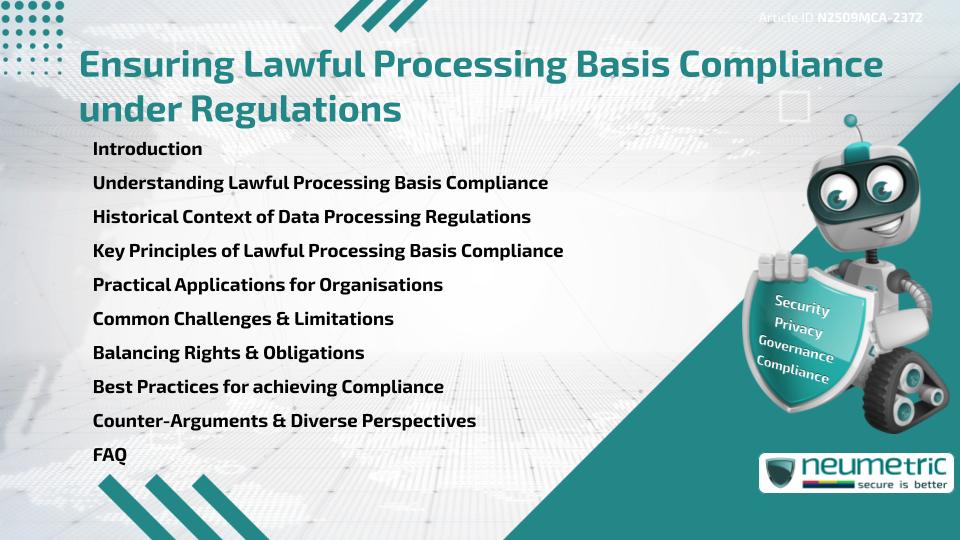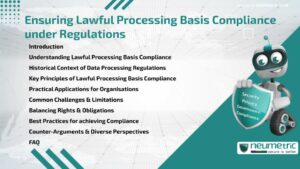Table of Contents
ToggleIntroduction
Lawful processing basis Compliance is a critical requirement for Organisations handling Personal Data under Global Regulations. It ensures that every act of data collection, storage & use rests on a legal foundation. From safeguarding individual rights to reducing the Risk of penalties, Lawful processing basis Compliance provides the Framework within which businesses operate responsibly. This article explains its historical roots, practical applications, challenges & strategies that Organisations can adopt to ensure Compliance.
Understanding Lawful Processing Basis Compliance
Lawful processing basis Compliance refers to the obligation of Organisations to justify their data processing activities with a valid legal ground. Regulations such as the General Data Protection Regulation [GDPR] emphasize that Organisations cannot process Personal Data without a legitimate reason. The Lawful bases typically include consent, contractual necessity, legal obligations, vital interests, public tasks & legitimate interests. Choosing the correct basis is essential because it determines how rights like withdrawal of consent or objection apply.
Historical Context of Data Processing Regulations
The concept of Lawful processing has its roots in early Privacy laws, which emerged to protect individuals from misuse of Personal Information. For example, the 1995 European Union Data Protection Directive laid the foundation for what became the GDPR. Over time, other jurisdictions, such as Canada with its Personal Information Protection & Electronic Documents Act [PIPEDA] and the United States with sector-specific laws, adopted similar principles. These frameworks collectively influenced the modern expectation of Lawful processing basis Compliance.
Key Principles of Lawful Processing Basis Compliance
The principles of Lawful processing basis Compliance rest on transparency, fairness & accountability. Organisations must inform individuals about the legal basis they rely on & ensure that the chosen basis aligns with the purpose of processing. For example, relying on consent requires clear communication, while invoking legitimate interests demands a balancing test to protect individual rights. Failure to align processing with the correct legal ground Risks undermining both Compliance & trust.
Practical Applications for Organisations
In practice, Lawful processing basis Compliance affects every aspect of organizational activity. Human resources teams may rely on contractual necessity to process Employee data, while marketing departments often depend on consent for promotional communications. Healthcare providers may invoke vital interests in emergencies. Regardless of sector, Organisations must document their reasoning & maintain Evidence of the chosen Lawful basis to demonstrate accountability to regulators.
Common Challenges & Limitations
One challenge in Lawful processing basis Compliance is over-reliance on consent when another basis might be more suitable. Consent must be freely given, specific & informed, but power imbalances often undermine its validity. Another limitation is the complexity of managing multiple Lawful bases across diverse data sets, which can overwhelm smaller Organisations. Additionally, interpretations of what constitutes legitimate interests vary across jurisdictions, creating uncertainty.
Balancing Rights & Obligations
Lawful processing basis Compliance requires balancing organizational needs with individual rights. For example, Organisations may claim legitimate interest in fraud prevention, but individuals still have the right to object. Striking this balance ensures that neither side is unfairly disadvantaged. Transparent communication & accessible opt-out mechanisms play a key role in maintaining this equilibrium.
Best Practices for achieving Compliance
Organisations can strengthen Lawful processing basis Compliance by embedding Privacy considerations into business processes. Conducting Data Protection Impact Assessments [DPIAs], training staff & establishing clear data Governance Policies are effective strategies. Documentation & regular reviews ensure that the Lawful basis remains appropriate as business practices evolve. Engaging with regulators & industry bodies also helps Organisations stay aligned with current interpretations of Compliance Requirements.
Counter-Arguments & Diverse Perspectives
Some critics argue that Lawful processing basis Compliance places an undue burden on Organisations, especially small enterprises lacking resources. Others highlight that overemphasis on Compliance can lead to a box-ticking culture rather than genuine respect for Privacy. Yet, advocates stress that strong Compliance fosters trust, reduces legal Risk & creates competitive advantage. Recognizing these perspectives allows Organisations to appreciate both the benefits & the challenges of Compliance.
Takeaways
- Lawful processing basis Compliance ensures that data processing activities rest on a legal foundation.
- Historical frameworks like the EU Data Protection Directive shaped current regulations.
- Organisations must align their chosen legal basis with processing purposes.
- Common challenges include over-reliance on consent & jurisdictional variations.
- Best Practices include conducting DPIAs, staff training & transparent communication.
FAQ
What is Lawful processing basis Compliance?
It is the requirement for Organisations to rely on a valid legal ground when processing Personal Data, ensuring alignment with regulatory frameworks.
Why is Lawful processing basis Compliance important?
It protects individual rights, builds trust & reduces legal Risks by ensuring that Organisations operate within a Lawful Framework.
Which legal bases are most commonly used?
The most common bases include consent, contractual necessity, legal obligations, legitimate interests, vital interests & public tasks.
Can Organisations change their Lawful basis after processing has started?
No, Organisations must identify the Lawful basis before processing begins & cannot switch later without restarting the process Lawfully.
What happens if an organisation fails to comply?
Non-Compliance can lead to regulatory fines, reputational damage & legal claims from individuals whose rights were infringed.
How does Lawful processing basis Compliance affect Small Businesses?
Small Businesses may face resource challenges in documenting & managing Compliance, but failure to comply still exposes them to Risks.
How does consent differ from legitimate interest?
Consent requires clear, informed agreement from individuals, while legitimate interest involves a balancing test between organizational needs & individual rights.
What tools can help Organisations achieve Compliance?
Tools such as Data Protection Impact Assessments, staff Training Programs & robust data Governance Policies support Compliance efforts.
References
- European Commission – Data Protection
- EDPB – Guidelines on Consent
- UNCTAD – Data Protection & Privacy Legislation Worldwide
Need help for Security, Privacy, Governance & VAPT?
Neumetric provides organisations the necessary help to achieve their Cybersecurity, Compliance, Governance, Privacy, Certifications & Pentesting needs.
Organisations & Businesses, specifically those which provide SaaS & AI Solutions in the Fintech, BFSI & other regulated sectors, usually need a Cybersecurity Partner for meeting & maintaining the ongoing Security & Privacy needs & requirements of their Enterprise Clients & Privacy conscious Customers.
SOC 2, ISO 27001, ISO 42001, NIST, HIPAA, HECVAT, EU GDPR are some of the Frameworks that are served by Fusion – a SaaS, multimodular, multitenant, centralised, automated, Cybersecurity & Compliance Management system.
Neumetric also provides Expert Services for technical security which covers VAPT for Web Applications, APIs, iOS & Android Mobile Apps, Security Testing for AWS & other Cloud Environments & Cloud Infrastructure & other similar scopes.
Reach out to us by Email or filling out the Contact Form…





